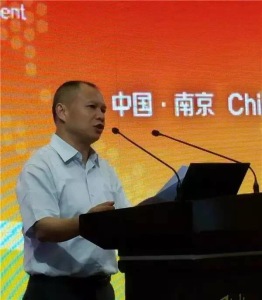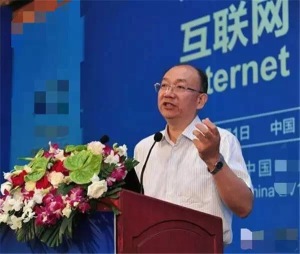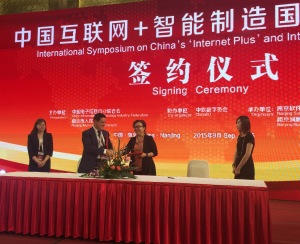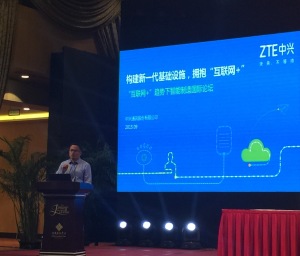ChinaEU signed an agreement with CITIF to represent China’s ICT industry in Brussels
September 2, Nanjing ChinaEU partnered with China Information Technology Industry Federation (CITIF) and the Nanjing government to promote the International Symposium on China’s ‘Internet Plus’ and Smart Manufacturing (中国互联网+智能制造国际研讨会). The Ministry of Industry and Information Technology (MIIT), ZTE, leading German software producer SAP, Chinese Internet-based systems and software developer AsiaInfo, China Academy of ICT (CAICT), together with ChinaEU and CITIF, all presented their views on the future role of Internet and discussed the new business opportunities unleashed by China’s policies of Internet Plus and China 2025.
At the opening of the symposium, Chen Wei, Director of Information Technology and Software Services of the MIIT, said: “Smart manufacturing will be the driver of China’s transformation into a modern, high-tech and high-energy efficient production power. Many developed countries have given great importance to the development of Internet and International collaboration in this field is crucial for the upgrade of the global manufacturing industry”.
Zhou Zixue, Secretary General of CITIF, recognized that China is a latecomer in the IT history, having introduced the Internet only in 1994. But, he pointed out: “The country is making very fast progress in the technology field. China lagged behind in 2G and 3G, is catching up in 4G and I am fully confident that Chinese vendors and telecom operators will be among the leading players in the technology of the future, 5G.”
Following the opening remarks, ChinaEU and CITIF signed a very important cooperation agreement aimed at expanding technological and economic cooperation between Europe and China in the digital field, by promoting Chinese investments and Chinese business interests in the European digital market, facilitating partnerships and business exchanges between European and Chinese ICT companies both in China and in Europe, and supporting the mutual understanding of the respective digital markets and their regulatory environments. CITIF is a federation of over 300 Chinese ICT companies, including the giants China Mobile, China Telecom, ZTE, Alibaba, Lenovo and Xiaomi. According to the agreement, ChinaEU will become the sole representative of CITIF in Brussels vis-à-vis EU institutions and European stakeholders. The Association will support CITIF members to enter the European market and will promote CITIF across Europe. CITIF commits to providing updated monitoring on China’s internal ICT market and the major changes in the regulatory environment, as well as supporting the interests of the European ICT industry in China.
This agreement follows the first visit of Minister Lu Wei, Head of the Cyberspace Administration of China, in Brussels in July. Such historic event has opened the door to more ambitious and more concrete digital cooperation between China and Europe with the creation of a strategic partnership between ChinaEU and China Internet Development Foundation (CIDF). CIDF is an important organization, recently formed by the Chinese government to promote the growth of China’s digital sector and develop international relations in the Internet field.
Luigi Gambardella, President of ChinaEU, has expressed confidence in China’s ability to become a forerunner of the technologies of the future. His intervention focused on 5G, the enabler of the fourth industrial revolution. He explained: “According to recent estimations, the creation of Industry 4.0, a concept originally conceived by Germany and now integrated by many European countries, could generate 500 EU billion of value added per year to the European manufacturing industry and create more than 6M jobs across the EU. But we will get nowhere if each nation alone develops its own Industry 4.0 strategy without considering what the other countries are doing. The 5G revolution, to be successful, must be global. To be credible, 5G needs a critical mass and this can only be achieved if standards are truly global. International cooperation is a priority and is required in three areas: spectrum, standards, and timing. China and Europe can have a leading role in setting the vision and the international standards of 5G and I hope to see the finalization of a EU-China joint agreement on 5G common research and development at the end of September, during the visit of Commissioner Oettinger in Beijing”.
Lin Xiaodong, Vice President of ZTE, talked about the disruptive forces of the new Internet applications for the existing infrastructure. He noted: “Infrastructure upgrade is at the core of the technological revolution. While many years have yet to come for the full development of 5G, ZTE is taking the lead in the innovative pre-5G technology, an intermediate step between 4G and 5G, which will allow for a 10 times faster Internet by 2016, utilizing the existing 4G networks.”
Wu Jun, CEO of AsiaInfo, commented on China’s role in the shaping of the ICT industry: “China has the potential to influence the global software industry, but we have to overcome a few challenges. Besides the necessity to increase the product quality and attract top international talents, China will have to empower its companies to go global in a more integrated way.”
Prior to joining the symposium, the team of ChinaEU has met with Miao Ruilin, Major o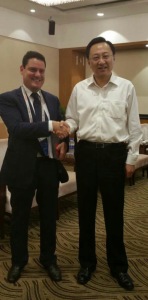 f Nanjing, who invited ChinaEU to visit the brand-new Jiangbei New Area (江北新区), in the north of the Yangtze River. This new area, covering 788 square kilometers, was officially approved by the State Council in early July and aims at driving the modernization of Southern Jiangsu, attracting around 3 million people by 2030.
f Nanjing, who invited ChinaEU to visit the brand-new Jiangbei New Area (江北新区), in the north of the Yangtze River. This new area, covering 788 square kilometers, was officially approved by the State Council in early July and aims at driving the modernization of Southern Jiangsu, attracting around 3 million people by 2030.
According to Luigi Gambardella, “Jiangbei New Area could be a unique opportunity for Nanjing to create the first Internet Plus District in China and in the world, thus becoming the first showcase of China’s new ambitious policies of Internet Plus and China 2025. The new district should differentiate itself from other new development zones across China, and should be designed in order to attract mainly the new industry and the “smart industrial production”, with the use of the most advanced technologies available worldwide, such as robots, 3D printers, drones, etc. and with the availability of super fast broadband and 5G trials.”


